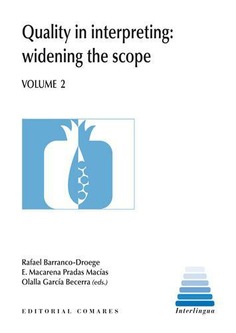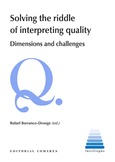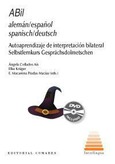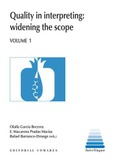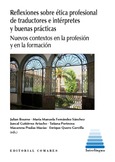QUALITY IN INTERPRETING: WIDENING THE SCOPE. VOLUMEN 2
Rafael Barranco-Droege (Editor) , E. Macarena Pradas Macías (Editora) , Olalla García Becerra (Editora)
Interpreting quality is conditioned by a myriad of factors, and going back to basics every now and then may help in asking the right questions. Moreover, the advancement of an applied science such as interpreting studies makes it indispensable to stop and check periodically whether the communication between research, training and professional practice is flowing properly.
With this in mind, in the context of the Second International Conference on Interpreting Quality, held in 2011 in Almunecar, Spain, it was decided to open a forum to allow participants to share their ideas with a broader audience. The result is a collection of interesting contributions developed from a variety of methodological perspectives, dealing with topics ranging from interpreter training to professional practice and including both spoken and signed languages.
From the perspective of interpreter training, the papers address topics such as the implementation of interpreting theory, ethics, mindfulness and the importance of visual input for simultaneous interpreting. The contributions related to professional practice focus on aspects like anticipation in simultaneous interpreting, the transfer of specialized knowledge and the constraints imposed by the market, while the assessment of interpreting skills received special attention as a cross-sectional topic. It is the editors hope that this volume will encourage further investigation in these areas.
This publication was funded by the Government of Andalusia (project ref. P07-HUM-02730). We would like to thank all authors for their contributions and warmly express our gratitude to Angela Collados Ais for her unrelenting endeavour in advancing the research on interpreting quality.
Preface
1. Interpretation quality: from cognitive constraints to market limitations
LUIS ALONSO BACIGALUPE
2. Desarrollo y tendencias de la evaluación de la calidad de la interpretación en China
BO GAO
3. La calidad percibida en interpretación consecutiva: un estudio en ámbito social con estudiantes en prácticas
ELENA ERRICO & MARA MORELLI
4. Anticipation during simultaneous interpreting from German into English: an experimental approach
ENA HODZIK
5. Estudio de la transmisión de conocimientos especializados en interpretación simultánea
TAMARA CABRERA CASTRO
6. Le role de la theorie de linterpretation dans la formation des interpretes de conference.
MA?GORZATA TRYUK
7. Mindfulness e interpretación: estudio empírico
AMPARO JIMÉNEZ IVARS, DANIEL PINAZO CALATAYUD
8. Las etapas del desarrollo de las competencias interpretativas y de síntesis de los estudiantes de interpretación: un estudio comparativo
DOLORES RODRÍGUEZ MELCHOR, SUSAN JEFFREY
9. Una propuesta de matriz formativa para evaluar la interpretación consecutiva
LARA DOMíNGUEZ ARAUJO
10. Learner autonomy via self-assessment in consecutive interpreting for novice learners in a non-interpreting environment
NORAINI IBRAHIM-GONZALEZ
11. Die (Un)Wichtigkeit der Bildubertragung beim Dolmetschen von Videokonferenzen eine Analyse im Bereich des Dolmetscherstudiums
MARCO ANTONIO FURTADO
12. Does it pay to be good? Quality and Ethics in Interpreter Education
MARIA BRANDER DE LA IGLESIA
13. Mediación e interpretación: una experiencia personal
AHMED KISSAMI MBARKI
14. Aproximación a los parámetros de calidad en la interpretación de la lengua de signos española
MARÍA C. BAO FENTE, RAYCO H. GONZÁLEZ MONTESINO
15. La formación del traductor e intérprete de lengua de signos brasileña y lengua portuguesa. Ámbitos de actuación y áreas de especialización: la necesidad de un servicio de calidad
JOEL BARBOSA JUNIOR
- Editor
- Rafael Barranco-Droege
- Editora
- E. Macarena Pradas Macías
- Editora
- Olalla García Becerra
- Colección
- Interlingua
- Número en la colección
- 121
- Materia
- Traducción
- Idioma
- Castellano
- EAN
- 9788490450819
- ISBN
- 978-84-9045-081-9
- Depósito legal
- GR. 1488/2013
- Páginas
- 344
- Ancho
- 17 cm
- Alto
- 24 cm
- Edición
- 1
- Fecha publicación
- 05-09-2013

